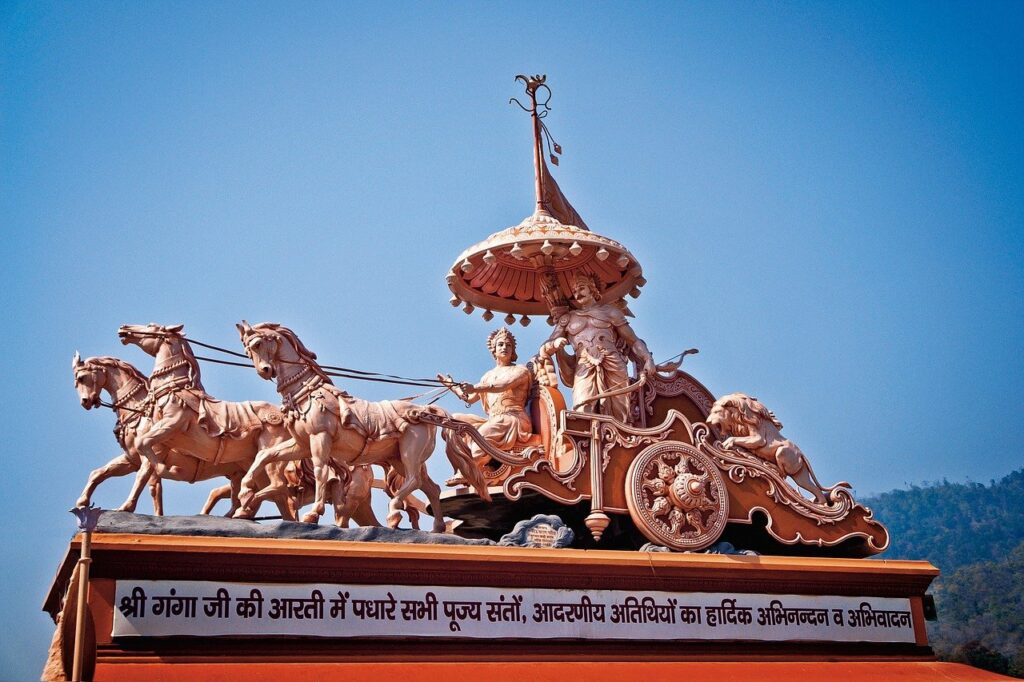
In today’s society, stress and anxiety have become widespread problems that afflict people from all backgrounds. While many attribute these issues primarily to over-work, a closer examination reveals that the root causes may extend beyond mere workload. Several compelling observations challenge the conventional belief, including the growing involvement of machines in task completion, the presence of stress among individuals with minimal work responsibilities, and the manifestation of stress during seemingly restful periods. This article delves into the underlying factors that contribute to stress and anxiety, seeking to shed light on their deeper origins. Additionally, it explores the wisdom derived from spiritual teachings, offering insights to cultivate inner calm in the face of these challenges.
The Struggle for Control: Unveiling the Illusion and Unraveling the Stress
The human tendency to exert an excessive degree of control over every facet of our lives stands as a common catalyst for stress. It matters not whether we possess dominion over forthcoming tasks and obligations; the ceaseless preoccupation with manipulating the uncontrollable inundates us with an overwhelming sense of apprehension. The relentless pursuit of managing that which eludes our grasp generates an environment rife with heightened anxiety and stress, surpassing the burden imposed by the sheer quantity of responsibilities alone.
Two pivotal factors conspire to fuel this obsession with over-control. Primarily, the remarkable strides witnessed in modernization and mechanization have bestowed upon us an unprecedented ability to manipulate various aspects of our existence. This unbridled control over the material realm fortifies the illusory notion that we are innately destined to assume the roles of ultimate arbiters. Moreover, the diminishing influence of spirituality and the rise of secularization have eroded our consciousness of a higher power or supreme governing force. In this spiritual ignorance, we are prone to embrace the fallacious belief that if we are not in charge, no entity possesses ultimate control. This misguided understanding fosters a perpetual state of worry and anxiety, fueled by the inexorable fear of an unguided existence. The Bhagavad-gita (18.35) astutely acknowledges the perils of such spiritual ignorance, cautioning that it begets a profound sense of fearfulness.

Let us try and understand this with the help of an example –
Consider an individual who meticulously plans a weekend getaway with their loved ones. They spend weeks researching and organizing every aspect of the trip, from selecting the perfect destination to booking accommodations and planning activities. They envision a relaxing and stress-free vacation where everything goes according to plan.
However, as the departure day arrives, unforeseen circumstances begin to unfold. A sudden thunderstorm disrupts their travel plans, leading to flight delays and cancellations. Despite their best efforts to control the situation by contacting airlines and seeking alternative arrangements, they find themselves at the mercy of external factors beyond their control.
The stress levels escalate as they grapple with the realization that their meticulously crafted itinerary is falling apart. The desire for complete control clashes with the unpredictability of external events, creating a sense of helplessness and frustration. They may find themselves overwhelmed with anxiety, worrying about the impact on their vacation experience and the disappointment it might cause for their loved ones.
In this example, the illusion of over control becomes apparent as the individual confronts the limitations of their ability to manipulate external circumstances. The stress arises not only from the disruption of their plans but also from the emotional burden of feeling responsible for the well-being and enjoyment of their companions. The more they cling to the need for absolute control, the more stress they experience when confronted with unforeseen events.
Illuminating the Path to Inner Calm: The Profound Wisdom of the Bhagavad Gita
The Bhagavad Gita, a profound and timeless spiritual scripture, imparts invaluable wisdom that can serve as a guiding light amidst the tumultuous journey of life, offering solace and liberation from the clutches of stress and anxiety. Within its verses lie transformative insights that have the power to counter our ignorance and bring about a profound sense of inner calm.
Firstly, the Gita gently reminds us of our eternal nature as souls, the indestructible essence that resides within us. It unveils the profound truth that the multitude of threats and challenges we encounter in our lives cannot truly harm our essential being. This realization liberates us from the shackles of fear and worry, as we come to understand that our core essence remains unscathed by the external circumstances that may assail us. The awareness of our eternal nature instills a profound sense of resilience, empowering us to face life’s trials with unwavering strength.

Moreover, the Gita unveils the sublime reality of God, the omnibenevolent supreme controller who orchestrates the grand symphony of existence. It reveals that even amidst the most chaotic and seemingly insurmountable situations, God has the remarkable ability to manifest good. By cultivating a mood of loving service towards God, we become active participants in the divine plan, recognizing that our role is not to control every outcome, but rather to surrender to the higher intelligence that governs the universe. Placing our trust in God’s infinite wisdom, we relinquish the burdensome weight of trying to manipulate every circumstance and outcome according to our limited understanding. This surrender fills our hearts with serenity, knowing that God will guide us towards the best possible outcome, even in the face of adversity.
Embracing these twin truths—our eternal nature as souls and God’s supreme benevolence—through the pursuit of spiritual knowledge and practice, we embark on a transformative journey towards inner calm. Gradually, as we internalize these profound insights, we develop an armor of serenity that shields us from the overwhelming effects of stress. The teachings of the Gita become a steadfast companion, offering solace in times of turbulence and illuminating the path to tranquility amidst the chaotic ebb and flow of life.
The Allure of Materialism and Its Consequences
In the current era of consumerist culture, we find ourselves inundated with a compelling narrative that equates the acquisition of possessions with the attainment of true happiness. The incessant pursuit of “having it all” or amassing material wealth, driven by this alluring notion, inevitably leads down a treacherous path paved with stress and anxiety. The Bhagavad-gita aptly characterizes those who sacrifice their moral principles in the relentless pursuit of material gains, even resorting to heinous acts such as murder. These individuals become ensnared in the vicious grip of endless anxiety, as affirmed by the Gita’s depiction of their state (16.11: cintam aparimeyam ca) and further reinforced (16.16: aneka citta vibhranta). Modern sociological trends align with this ancient wisdom, as the surge of consumerism correlates with a sharp rise in anxiety-related disorders. The reverberations of an impending anxiety epidemic loom over our society, necessitating a reevaluation of our priorities.

Let us try to understand this with the help of an example –
Imagine an ambitious professional who dedicates their life to climbing the corporate ladder. Driven by the relentless pursuit of success and the promise of material wealth, they work tirelessly, sacrificing personal relationships, leisure time, and even their well-being. They accumulate wealth, status, and possessions, believing that these external markers of achievement will bring them the ultimate happiness they seek.
However, as they continue on this relentless path, the weight of their aspirations begins to take a toll. The pressure to maintain their status and the constant need to outperform their peers engulfs them in a web of stress and anxiety. The once-desired possessions become burdensome symbols of their never-ending pursuit, constantly reminding them of the next target to conquer and the fear of losing what they have attained.
They find themselves caught in a cycle of insatiable desires, always yearning for more, comparing themselves to others, and fearing the loss of their hard-earned gains. The constant chase for material success and the unrelenting pressure to meet societal expectations leave them emotionally exhausted and mentally strained.
Underneath their seemingly perfect exterior, the cracks of stress begin to show. Sleepless nights, health issues, strained relationships, and a pervasive sense of emptiness become their constant companions. The allurement of materialism, which once promised fulfillment and happiness, now reveals its deceptive nature as a source of never-ending stress and dissatisfaction.
In this example, the individual’s unwavering focus on material pursuits and the allure of external markers of success leads them down a path of chronic stress and anxiety. The relentless desire for more possessions and achievements fuels their fears, creates a constant sense of inadequacy, and prevents them from finding true contentment and inner peace.
It serves as a stark reminder that the pursuit of material allurement, if left unchecked, can result in a life consumed by stress, where the very possessions that were once coveted become shackles that bind one’s well-being and sense of fulfillment.
Beyond Material Allure: Unveiling the Source of Enduring Contentment
Instead of incessantly striving to accumulate the transient offerings of this material world, the wisdom espoused by the Gita beckons us to redirect our pursuits towards a source of fulfillment that transcends the fleeting nature of material possessions. It urges us to forge a devotional connection with God, for in such a connection lies the key to enduring contentment. God, as the epitome of perfection, encompasses and radiates the six opulences—beauty, strength, wealth, knowledge, fame, and renunciation—that captivate and enthrall our hearts. When we place God at the very center of our lives, it does not entail deprivation or renunciation of worldly pleasures. Instead, it ensures that our pursuit of worldly aspirations remains harmoniously intertwined with our unwavering devotion to the divine.
The example of Arjuna stands as a powerful testament to this profound truth. When faced with the daunting choice between God and God’s formidable army, Arjuna chose to prioritize his connection with the divine over the allure of material power. In his surrender to God’s guidance, he discovered a higher victory—one that transcended the boundaries of temporal achievements. Arjuna’s path illuminated the path for us to follow, wherein the pursuit of God becomes the ultimate fulcrum of our existence, granting us access to a realm of lasting fulfillment that surpasses the transient allure of material wealth.

In the pursuit of divine connection and devotion, we find a profound antidote to the stress and anxiety that pervade our lives. By embracing the teachings of the Gita and channeling our energy towards cultivating a heartfelt relationship with God, we unearth a reservoir of inner tranquility that shields us from the tumultuous currents of the material world. In this transformative journey, we discover that true fulfillment lies not in the possession of material goods, but in the eternal embrace of the divine presence.
A Poem : Serenity Unveiled – Wisdom from the Bhagavad Gita
In a world consumed by stress and fear,
Where anxiety looms and troubles appear,
We seek the cause, the deeper origin,
Of these burdens that weigh and wear us thin.
For control, we grasp with fervent desire,
To tame the chaos, quench the inner fire,
But the more we strive to command and sway,
The more stress and anxiety come our way.
Machines and modernization, they offer power,
To manipulate our lives, every hour,
Yet amidst this control, we fail to see,
The illusion that blinds us, causing anxiety.
Spirituality, a guiding light we find,
In the Bhagavad Gita, wisdom intertwined,
It reminds us of our eternal soul’s grace,
Unharmed by external storms we face.
God, the supreme controller of all,
In chaos and challenges, He won’t let us fall,
By surrendering to His divine plan,
We find serenity, guided by His hand.
Materialism’s allure, a tempting snare,
Promising happiness, but leading to despair,
The pursuit of possessions, a never-ending quest,
Leaving us stressed, unsatisfied, and unrest.
But the Gita reveals a different way,
To find contentment, to keep stress at bay,
Forge a connection with the divine above,
A path of devotion, brimming with love.
Arjuna, a warrior faced with a choice,
To prioritize God, to hear His voice,
He showed us the path to lasting delight,
Transcending the bounds of temporal might.
In pursuit of the divine, anxiety fades,
As we embrace the Gita’s teachings, cascades,
Of inner calm and tranquility unfold,
Shielding us from stress, making us bold.
No longer chained by material desires,
We find fulfillment that forever inspires,
True contentment lies in the divine embrace,
Not in possessions, but in God’s grace.
So let us unravel the stress that ensnares,
With the wisdom of the Gita, beyond worldly affairs,
In its verses, we find solace and release,
Guiding us to inner calm, bringing us peace.
